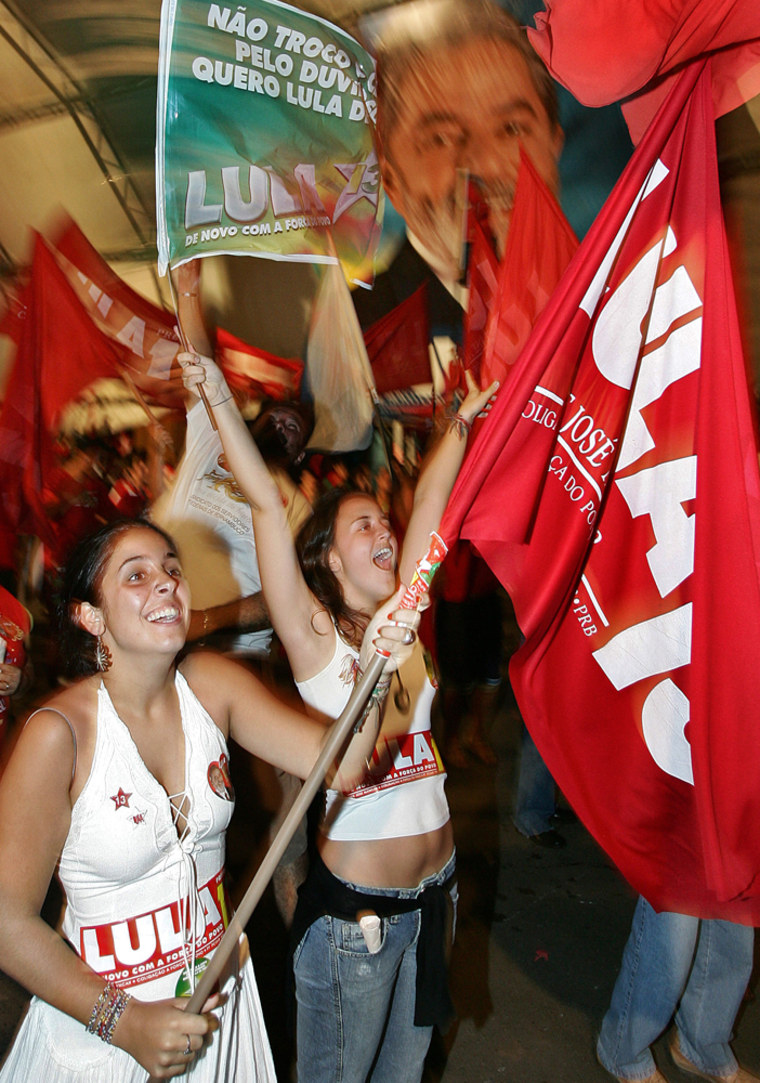President Luiz Inacio Lula da Silva won a second term in a landslide victory Sunday with Brazilians rewarding their first working class leader after he helped ease grinding poverty while improving the economy of Latin America’s largest country.
The leftist former union leader, who had the support of tens of millions of poor voters, easily topped center-right rival Geraldo Alckmin, whose tepid campaign style and robotic image failed to win over ordinary Brazilians.
With 99 percent of the votes counted, Silva had 61 percent support compared to 39 percent for Alckmin, Sao Paulo state’s former governor.
“We’re going to do a lot better in my second term than we did in the first,” Silva told cheering supporters in a Sao Paulo hotel. “The foundation is in place, and now we have to get to work.”
Beaming in a white T-shirt emblazoned with “It’s Brazil’s Victory” in the yellow and green colors of the Brazilian flag, Silva promised to boost growth and reduce inequality to put the country on track to reach the ranks of developed nations.
Alckmin did not immediately comment on the outcome, though Silva and an aide said he made a phone call to congratulate the president on his victory.
Silva’s win came after Alckmin made a surprisingly strong showing in a first round of voting on Oct. 1. The vote went to a second round after Silva failed to get 50 percent plus one vote required for an outright win.
Increased social spending
But Silva had the firm support of Brazil’s poor, who have benefited over the past three years as Silva increased social spending without raising taxes. Silva also overcame corruption scandals that tarnished the image of his administration.
His Workers Party has been battered for two years by charges of vote-buying and illegal campaign financing, scandals that have cost the former labor leader and lathe operator his reputation as a bastion of political ethics.
Silva came to power four years ago by employing strong leftist rhetoric, but he ended up governing as a centrist with a conservative economic policy in his first term.
He is considered more moderate than other South American leftist leaders like Venezuela’s Hugo Chavez and Bolivia’s Evo Morales. Analysts said Silva probably will not change much in his second term.
Nearly 126 million Brazilians voted in Sunday’s runoff elections for president and for governor in 10 of Brazil’s 27 states.
Polls before the first round of voting had predicted Silva would win outright then, but his campaign was tripped up after the news media ran photos of $770,000 in cash that members of his Workers Party allegedly planned to spend purchasing an incriminating file about Alckmin and his allies.
Cover-up?
Former-President Fernando Henrique Cardoso, who was in office for eight years prior to Silva and helped found Alckmin’s Brazilian Social Democracy Party, continued Sunday to hammer at the allegations against Silva’s party, known here as the PT.
“The PT can’t cover up the crimes, Brazil has to investigate,” Cardoso said. “Brazil is tired of impunity.”
Regardless, Alckmin failed to make the corruption charges stick to Silva during the second round.
Instead, Silva battered his opponent with accusations that the former governor of Brazil’s richest state would privatize cherished state industries and end the popular Family Allowance program that provides monthly payouts to 11 million poor families as long as they keep their children in school and get them vaccinated.
While Alckmin has repeatedly said he would continue the program, analysts say it has helped lift millions out of poverty and translated into guaranteed votes for Silva. Also, Silva managed to reduce Brazil’s notoriously high inflation through high interest rates, and prices of staples such as rice and beans even dropped.
Aloisio Pisco, a 36-year-old doorman, said Silva’s handling of the economy earned him the right to a second term.
“Lula, he’s the best; he’s created jobs and prices are cheaper,” Pisco said after voting in Sao Paulo.
Others said Alckmin deserved high marks for his adept administration of Sao Paulo state.
“I thought Alckmin was better prepared to become president,” said Reginaldo Fernando Pittarelli, 29-year-old machinery designer. “And I would have never voted for Lula because of all the corruption surrounding his government.”
